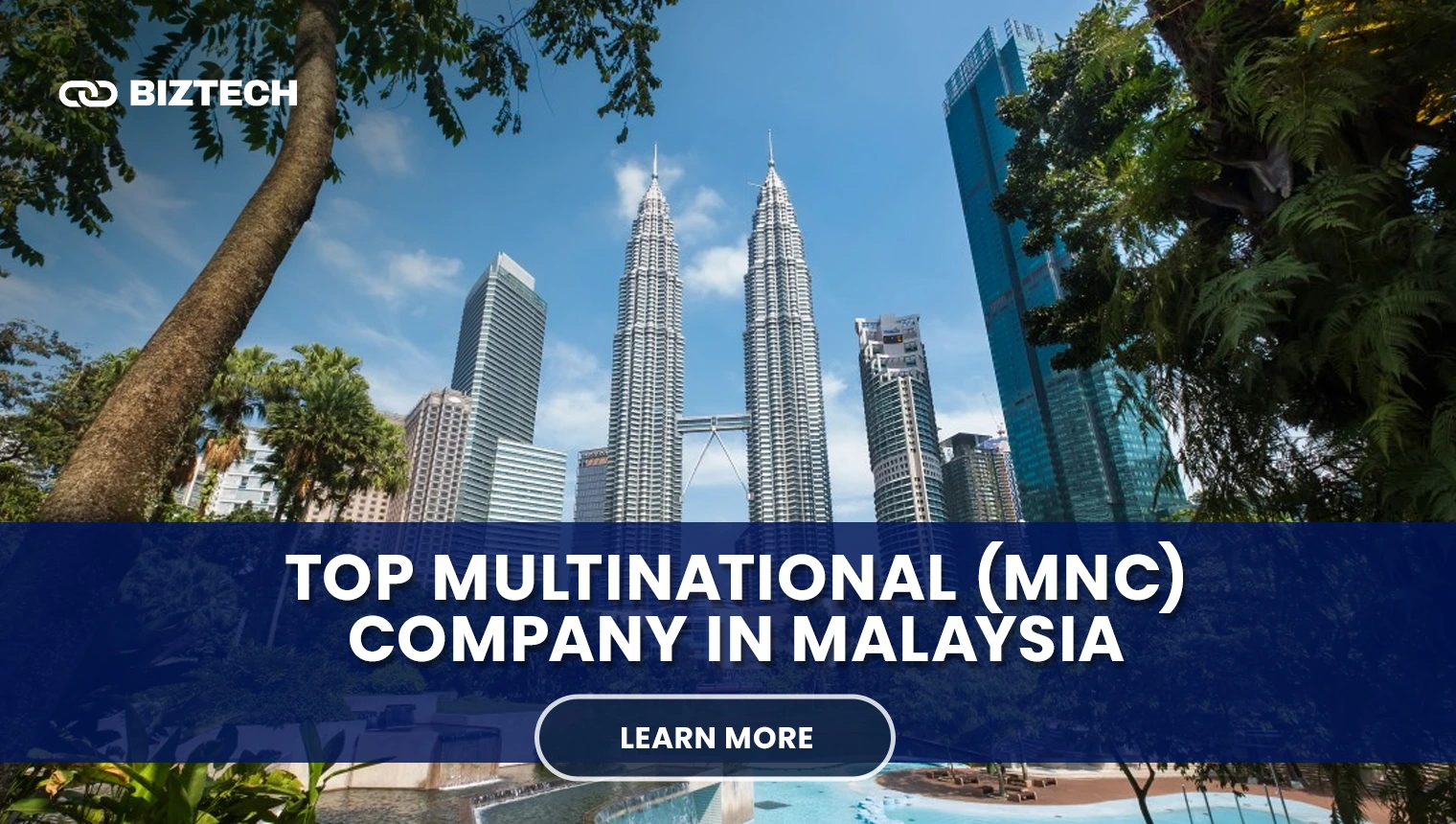There are a substantial number of well-established MNC companies in Malaysia that have maintained a presence in the country for many years.
- What Is A Multinational Corporation (MNC)?
- What Drives MNC Success in Malaysia?
- List of Top MNC Company in Malaysia
- 1. Alphabet Inc.
- 2. Axiata Group Berhad
- 3. BASF Malaysia Sdn Bhd
- 4. ExxonMobil Malaysia
- 5. Honda Malaysia
- 6. Intel Malaysia
- 7. Panasonic Malaysia
- 8. Petroliam Nasional Berhad (Petronas)
- 9. Proton Holdings Berhad
- 10. Sime Darby Berhad
- 11. Tenaga Nasional Berhad (TNB)
- 12. YTL Corporation Berhad
- 13. Nestlé Malaysia
- 14. Samsung Malaysia Electronics
- 15. Oracle Malaysia
- 16. Huawei Technologies (Malaysia) Sdn Bhd
- 17. Shell Malaysia
- 18. Microsoft Malaysia
- 19. NVIDIA Corporation
- 20. ByteDance (TikTok)
- Pros and Cons of MNC Company in Malaysia to Workers
- Advantages:
- Disadvantages:
- Upskilling for the MNC Environment
- Essential Skills for the Modern MNC Employee
- Continuous Learning and Development (L&D)
- Utilising Online Platforms for Skill Enhancement
- 1. Udemy:
- 2. Coursera:
- 3. LinkedIn Learning:
- 4. FutureLearn:
- Building Global Mindset
- The Working Culture in MNCs – Is It Right for You?
- 1. Abundant Resources:
- 2. Structured Environment:
- 3. Diversity:
- 4. Office Perks:
- Conclusion
Serving as a global hub for MNCs, Malaysia offers an appealing prospect for companies aiming to initiate or broaden their operations in different regions. The nation’s cost-effective business environment adds to its attractiveness for MNC companies.
This introductory overview outlines Malaysia’s allure as a prime business location, emphasising its strategic positioning and robust business infrastructure. It lays the foundation for a more in-depth examination of the merits and demerits of establishing an MNC company in Malaysia.
What Is A Multinational Corporation (MNC)?
As implied by its name, an MNC is a company that operates and oversees the production of goods or services in multiple countries, extending beyond its origin.
According to Black’s Law Dictionary, an MNC is a company or group that generates 25% or more of its revenue from operations outside its home country.
It is also referred to by various other terms, including multinational enterprise (MNE), transnational enterprise (TNE), transnational corporation (TNC), and international corporation.
What Drives MNC Success in Malaysia?
The Prosperity of Multinational Company in Malaysia:
Malaysia’s attractiveness as a thriving business destination in the Asia Pacific region can be attributed to several key factors:
- Strategic Location: Malaysia’s advantageous geographical location places it in the heart of Southeast Asia, with close proximity to Singapore, a vibrant regional business centre.
- Business-Friendly Environment: The World Bank, in its 2014 report, ranked Malaysia as the 6th most business-friendly country globally. Surpassing nations like Australia and the United Kingdom, Malaysia provides an inviting environment for enterprises.
- Robust Infrastructure: Malaysia boasts a well-established infrastructure that supports various industries and sectors.
- Skilled Workforce: The country benefits from a highly educated workforce, and English is widely utilised as a language for business.
- Efficient Transport Network: Malaysia’s exceptional infrastructure and transportation connectivity further enhance its appeal to businesses.
- The nation’s diverse, multilingual, and multicultural society has undoubtedly created numerous opportunities. Furthermore, Malaysia’s favourable World Bank ranking for ease of doing business has bolstered its reputation.
Malaysia is a global hub, particularly for offshore manufacturing and service-based operations. It’s no surprise that over 5,000 companies in Malaysia have attracted investments from multinational corporations in more than 40 countries worldwide.
Additionally, a substantial number of multinational company in Malaysia are bolstered by its foreign business participation regulations, which are notably more straightforward compared to many other Asian countries. This streamlined approach means that foreign enterprises encounter less bureaucratic obstacles when establishing a business presence in Malaysia.
List of Top MNC Company in Malaysia
1. Alphabet Inc.
Alphabet Inc., the parent company of Google, is one of the world’s most influential tech companies. With a significant presence in Malaysia, Alphabet Inc. contributes to the nation’s digital ecosystem by offering a wide range of services including search, advertising, and cloud solutions. Through initiatives like Google for Startups and Google Digital Skills Training, the company empowers Malaysian entrepreneurs and professionals, fostering innovation and supporting the country’s digital transformation goals.
2. Axiata Group Berhad
Axiata Group Berhad, formerly TM International Berhad, is one of Malaysia’s largest telecommunications companies. Operating across Asia, it offers mobile, fixed, and digital services to over 150 million customers. Axiata’s subsidiaries, including CelcomDigi, have become household names, playing a pivotal role in Malaysia’s connectivity landscape. The company is also heavily involved in advancing 5G infrastructure in Malaysia and championing digital inclusion.
3. BASF Malaysia Sdn Bhd
BASF Malaysia Sdn Bhd, a subsidiary of Germany’s BASF, is a key player in the chemical industry. The company provides solutions in agriculture, industrial materials, and sustainable development. BASF Malaysia operates state-of-the-art facilities in various locations, contributing to Malaysia’s growth in the chemical manufacturing sector. Their focus on sustainable production aligns with Malaysia’s push for green industrial practices.
4. ExxonMobil Malaysia
ExxonMobil is one of the world’s largest publicly traded oil and gas companies, and its Malaysian operations are vital to its Asia-Pacific presence. The company has been in Malaysia for decades, involved in upstream and downstream activities such as exploration, production, and refining. ExxonMobil Malaysia supports community development and environmental conservation efforts, highlighting its corporate social responsibility in the energy sector.
5. Honda Malaysia
Honda Malaysia is a subsidiary of Honda Motor Company, a Japanese multinational known for its automobiles and motorcycles. Honda’s local production facilities in Malaysia manufacture popular models like the Honda City and CR-V. The company has embraced green technology with hybrid and electric vehicles, supporting Malaysia’s transition to cleaner transportation solutions.
6. Intel Malaysia
Intel Malaysia plays a critical role in the global operations of Intel Corporation. Established in Penang in 1972, it is one of the largest semiconductor assembly and test sites for Intel. The company has invested heavily in R&D, training Malaysian talent, and fostering innovation in computing technologies. Intel Malaysia’s contributions significantly bolster Malaysia’s standing as an electronics manufacturing hub.
7. Panasonic Malaysia
Panasonic Malaysia is part of the Japanese multinational corporation known for its consumer electronics, home appliances, and industrial solutions. The company emphasizes sustainability by producing energy-efficient products and engaging in initiatives like renewable energy solutions and eco-friendly practices. Panasonic is a trusted brand in Malaysian households and industries alike.
8. Petroliam Nasional Berhad (Petronas)
Petronas is Malaysia’s national oil and gas company and a Fortune Global 500 enterprise. It operates in upstream and downstream sectors globally, with its headquarters in Kuala Lumpur. Petronas is a major contributor to Malaysia’s economy and actively supports renewable energy projects, environmental conservation, and community development initiatives.
9. Proton Holdings Berhad
Proton, Malaysia’s first national car manufacturer, has evolved into an international player in the automotive industry. Partnering with companies like Geely, Proton produces vehicles known for their affordability, safety, and innovative features. Its exports to over 20 countries enhance Malaysia’s reputation in automobile manufacturing.
10. Sime Darby Berhad
Sime Darby is a multinational conglomerate operating in plantations, industrial equipment, motors, property, and logistics. Its focus on sustainability is evident in its environmentally friendly agricultural practices and green building initiatives. Sime Darby has a significant presence in Malaysia and contributes to various sectors critical to the nation’s development.
11. Tenaga Nasional Berhad (TNB)
TNB is Malaysia’s largest electricity provider and plays a crucial role in powering the nation. It has invested significantly in renewable energy sources, including solar, wind, and hydroelectric projects. TNB’s efforts to modernize Malaysia’s energy infrastructure align with the government’s goal of achieving carbon neutrality by 2050.
12. YTL Corporation Berhad
YTL Corporation is a Malaysian conglomerate with diversified interests in telecommunications, power generation, cement manufacturing, and hospitality. Its global footprint spans 10 countries, with high-profile projects such as the construction of energy-efficient buildings and eco-friendly resorts. YTL’s commitment to sustainable development has earned it accolades in Malaysia and abroad.
13. Nestlé Malaysia
Nestlé Malaysia is a subsidiary of Nestlé, the Swiss food and beverage giant. Known for brands like Milo, Maggi, and KitKat, Nestlé Malaysia is a household name. The company prioritizes sustainability by sourcing responsibly, reducing packaging waste, and promoting balanced diets through its products.
14. Samsung Malaysia Electronics
Samsung Malaysia Electronics is the local arm of the South Korean technology giant. It offers a wide range of products, from smartphones to home appliances. Samsung actively supports Malaysia’s digital infrastructure growth, particularly in 5G technology and smart city initiatives, contributing to the nation’s technological advancement.
15. Oracle Malaysia
Oracle Malaysia, part of the American multinational Oracle Corporation, has made headlines with its investment in Malaysia’s first public cloud region. This $6.5 billion project aims to enhance the country’s cloud infrastructure, supporting businesses and fostering innovation. Oracle’s software solutions play a crucial role in Malaysia’s growing IT landscape.
16. Huawei Technologies (Malaysia) Sdn Bhd
Huawei Malaysia, a subsidiary of the Chinese tech giant Huawei, has been a key player in Malaysia’s digital transformation since 2001. It focuses on developing 5G infrastructure, smart city solutions, and advanced technology training through the Huawei ASEAN Academy. Huawei also offers a wide range of consumer electronics, including smartphones and wearables, making it a major contributor to Malaysia’s tech ecosystem.
17. Shell Malaysia
Shell Malaysia, a subsidiary of Royal Dutch Shell, has been operating in Malaysia for over a century. The company is involved in various sectors, including upstream exploration, downstream refining, and the marketing of oil and gas products. Shell’s commitment to sustainability is evident through its investments in renewable energy and efforts to reduce carbon emissions within its operations.
18. Microsoft Malaysia
Microsoft has significantly expanded its presence in Malaysia, focusing on cloud services and AI infrastructure. The company announced substantial investments to establish data centers and support the nation’s digital transformation initiatives. Microsoft’s collaborations with local businesses and government agencies aim to enhance digital literacy and drive economic growth through technology.
19. NVIDIA Corporation
NVIDIA, renowned for its graphics processing units (GPUs) and AI technologies, has partnered with Malaysian conglomerate YTL Corporation to develop AI infrastructure in Malaysia. This collaboration includes building one of the world’s fastest supercomputers, positioning Malaysia as a regional hub for AI development and research.
20. ByteDance (TikTok)
ByteDance, the parent company of TikTok, has invested in establishing data centers in Malaysia, particularly in the Johor region. These investments are part of a broader strategy to enhance data management capabilities and comply with regional data sovereignty requirements. ByteDance’s presence contributes to Malaysia’s growing digital economy and the development of its tech infrastructure.
Pros and Cons of MNC Company in Malaysia to Workers
Setting up a multinational company in Malaysia offers a range of benefits as well as a few challenges that aspiring global companies should consider:
Advantages:
1. Specialisation in Production:
MNCS have the flexibility to distribute product processes across different countries, allowing them to manufacture various components in region that are best suited for specific tasks, as a results, MNCS can optimize their product production efficiency and create products that are tailored to the needs of local markets.
2. Outsourcing Opportunities:
MNCs can leverage outsourcing, especially for labor intensive tasks that can be more costly in their home countries. Outsourcing to regions with lower labor costs can help reduce overall expenses.
3. Economies of Scale:
By expanding production into developing countries like Malaysia, MNCs can capitalise on economies of scale. This expansion enables them to lower long term average costs and improve overall operational efficiency.
4. Tax Advantages:
Developing countries often offer favourable tax schemes and incentives to attract foreign investors. Establishing a company in countries like Malaysia can lead to tax benefits for MNCs, which fosters economic growth and foreign investments in the region.
5. Access to a Wider Consumer Base:
Operating internationally grants MNCs access to a much larger and more diverse consumer market. Instead of limiting sales to a single domestic market, companies can tap into a global audience, increasing their sales potential.
Disadvantages:
1. Loss of Sovereignty:
One of the main disadvantages faced by MNCs is their need to comply with the host country’s rules and regulations. While they may be economically influential, they must respect and adhere to the laws and policies of the countries they are operating in, which impedes on their autonomy.
2. Competition:
Unless an MNC offers products or services that are very unique and difficult to replicate, they will face competition in every country they operate in.
Once local markets become familiar with what they offer, there are risks of local businesses replicating their products and selling them at lower prices. This will intensify the need for MNCs to invest in market development, marketing, and research and development (R&D) to stay competitive.
3. Economic Exploitation:
MNCs are primarily profit oriented entities, and this drive for profits can sometimes lead to economic exploitation in host countries. And this exploitation can manifest as an excessive use of natural resources and raw materials, paying low wages to local employees, or selling products at high prices to maximize profit.
In summary, while establishing an MNC in Malaysia offers many advantages, it comes with an equal amount of drawbacks. So MNCs should be mindful of where and when they are expanding their global operations.
Upskilling for the MNC Environment
Essential Skills for the Modern MNC Employee
1. Cross-Cultural Communication Skills:
Effective cross-cultural communication is essential in international business. Whether dealing with colleagues, clients, or customers from diverse backgrounds, it demands sensitivity, respect, and diplomacy.
Embrace an open-minded approach, conduct research, and understand cultural differences. This awareness, from interpreting workplace confrontation to maintaining eye contact, prevents misunderstandings and fosters better workplace communication.
Studies highlight that communication breakdowns are a leading cause of project failure. Listening skills are crucial, especially when working across language barriers.
2. Exceptional Networking Abilities:
Building a strong international network is vital for success in international business. Networking offers access to unexpected global opportunities, with reports suggesting up to 80% of jobs are secured through networking.
While online platforms like LinkedIn facilitate global connections, in-person networking remains crucial. Perfect your “elevator pitch” and attend industry events to meet like-minded professionals.
Diplomacy, tact, and attentive listening are key to nurturing relationships. Business school, especially an MBA or Executive MBA program, offers valuable networking opportunities with diverse peers, professors, and future collaborators.
3. Collaboration:
Collaboration is not just about networking; it’s about working effectively with others towards a common goal. Humility and confidence are vital, as it involves allowing others to lead, sharing credit, tackling problems, and giving/receiving feedback respectfully.
In an international business setting, collaboration with multicultural teams enhances cross-cultural communication skills and exposes you to fresh perspectives for addressing complex challenges. The most successful business leaders excel at collaboration, recognising the power of collective brainpower in driving company success.
4. Emotional Intelligence:
Emotional intelligence is considered a crucial asset in international business as it significantly impacts various aspects of business interactions.
Individuals with high emotional intelligence exhibit self-awareness and emotional control, enabling them to respond calmly in high-pressure business scenarios and adapt adeptly to change. They excel at effective teamwork, displaying strong interpersonal skills and a heightened sense of empathy.
To enhance the professional skills associated with emotional intelligence, researchers from Ashridge Executive Education at Hult International Business School are exploring the role of mindfulness practice in leadership development.
Continuous Learning and Development (L&D)
The pandemic and economic challenges have prompted a shift in Learning and Development (L&D) strategies. Reports indicate that 67% of HR managers are increasing L&D budgets, and L&D leaders now have a stronger presence at the C-suite level.
In the post-pandemic era, four trends can help L&D professionals address new pressures:
1. Upskill & Reskill:
Create Ecosystems: In the digital age, organisations should facilitate active skill acquisition among employees globally.
A robust and user-friendly learning ecosystem that integrates training content, learning analytics, and feedback tools can engage employees in new learning initiatives.
Various companies offer no-code solutions for building learning ecosystems, such as Leapsome and 360Learning.
2. Emphasise Video Content:
According to CIPD, video content is a highly effective and engaging format for corporate learning, as highlighted by increased usage during the pandemic.
However, video production can be time-consuming and costly, especially for multinational teams catering to diverse markets.
Automation tools for video creation, editing, summarization, and transcription are essential for optimising production cycles.
3. Localiser L&D Materials:
Overcoming language and cultural barriers within multicultural teams is crucial. Standardising L&D materials in English may not be the best approach, as not all employees may be proficient in English.
Using English as a shared language can lead to misunderstandings. Multilingual learning content production, aided by services like AI Voiceover, can save time and costs on localization and editing.
L&D’s increased attention from organisational leaders is a positive development, but L&D leaders must focus on effective utilisation of time and budgets. This involves outsourcing, automation, and self-upskilling to meet the evolving needs of the workforce in 2022.
Utilising Online Platforms for Skill Enhancement
To meet the growing demands on L&D departments in a multinational company in Malaysia, choosing the right upskilling tool is vital for data-driven decisions. We’ve compiled a list of top upskilling platforms with subscription details, advantages, user ratings, and more to facilitate informed choices.
1. Udemy:
Udemy is a leading upskilling platform offering eLearning courses for individuals and organisations. With 15,000+ courses in ten languages, it helps employees enhance their skills and stay adaptable. Udemy also allows businesses to host their content on the platform.
2. Coursera:
Coursera provides massive open online courses, fostering individual and workforce upskilling. Coursera for Businesses offers unlimited access, skill metrics, user analytics, and integrations for organisations. Managers can use Coursera courses to guide employees in skill development through engaging content, including guided Projects for hands-on training.
3. LinkedIn Learning:
LinkedIn Learning, part of the professional networking platform, offers eLearning courses to individuals. It also provides customised online learning for businesses to efficiently upskill their workforce. Tailored courses enhance learner engagement.
4. FutureLearn:
FutureLearn offers a diverse range of courses for career advancement and knowledge refreshment. It includes micro-credential programs, certifications, online degrees, and short courses.
Collaborating with 175 partners, including prestigious UK universities, FutureLearn covers various subjects with the involvement of non-university partners like Amnesty International and UNESCO.
Building Global Mindset
Employees with a ‘global mindset’ outperform their peers, as per CultureWizard’s Global Mindset Index Study. This mindset allows individuals to adapt effectively to different cultures, enhancing business interactions.
Companies emphasising intercultural skills are more likely to achieve their strategic priorities. ‘Overachieving’ companies acknowledge cultural diversity in business, in contrast to ‘underachievers.’ Promoting a global mindset as a corporate value is a key differentiator. Overachievers actively support employees in developing a global perspective and value a global mindset.
Cultural missteps, such as Walmart’s experience in Germany, highlight the importance of understanding cultural differences when expanding internationally. A global mindset doesn’t mean changing values but adjusting behaviour to interpret others’ actions accurately. CEOs must maintain authenticity while adapting their leadership style. Companies can foster a global mindset through events, recognition, and ongoing reinforcement.
The Working Culture in MNCs – Is It Right for You?
When it comes to work culture and practices, MNCs usually prioritise formal processes and procedures. Choosing the right job is one of life’s critical decisions, and in the following sections, we’ll explore the cultures of a multinational company in Malaysia.
1. Abundant Resources:
MNCs typically offer competitive compensation, bonuses, and benefits like insurance subsidies. They invest in employee training, including international conferences and skill development.
2. Structured Environment:
MNCs have well-established processes and clear policies, simplifying decision-making. Comprehensive training programs ensure employees are well-prepared for their roles.
3. Diversity:
A multinational company in Malaysia tends to have more diverse workforces, offering professional and personal networking opportunities.
4. Office Perks:
MNCs often provide additional perks like gym memberships, social events, and on-campus amenities.
When considering a multinational company in Malaysia, be sure to check Glassdoor reviews for insights into their work culture and employee experiences.
Read also: 10 Best Banks in Malaysia
Conclusion
In conclusion, Malaysia is an enticing hub for prominent MNC company, many of which have a well-established global presence spanning across 30 or more countries.
These companies enjoy a strong reputation and are highly sought after by job seekers in the country. Despite the intense competition for positions within these MNC company, Malaysia offers a conducive environment for both professional development and entrepreneurial initiatives.
The nation’s strategically advantageous location in the heart of Southeast Asia further solidifies its appeal to multinational corporations seeking to expand their operations. This distinctive combination of opportunities for career advancement and business expansion underscores Malaysia’s position as a top destination for professionals and entrepreneurs.
Read also: Top 10 Biggest IT Companies in Malaysia






